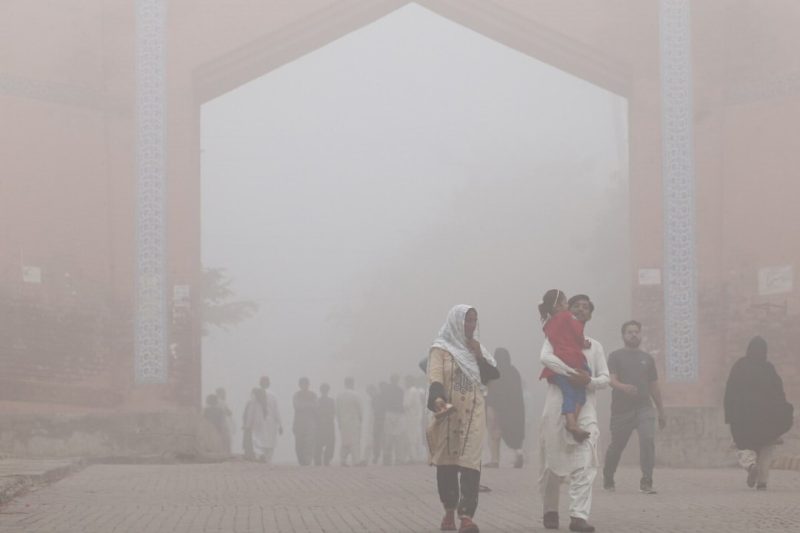
Pakistan Pushes for Climate Diplomacy as Smog Crisis Grips Major Cities

As winter descends in South Asia, Pakistan faces a severe air quality crisis affecting millions. Cities like Lahore are blanketed in thick smog, driving officials to call for climate diplomacy as the only way forward. Leaders in Punjab, Pakistan’s most populous province, have reached out to neighboring India for cooperation to tackle shared air pollution challenges.
The Cross-Border Nature of Pollution
Pakistan and India share more than just a border; they share an environmental dilemma that intensifies each winter. Pollutants travel across borders through air corridors, complicating efforts to assign blame or find quick solutions. Lahore’s Environmental and Climate Change Secretary, Raja Jahangir Anwar, emphasizes that pollution from India contributes to Lahore’s air quality crisis through eastern wind corridors. His call for cooperation underscores that this crisis transcends national boundaries.

@aljazeeraenglish | Instagram | Pakistan and India share an environmental dilemma that intensifies each winter.
Stubble Burning: A Key Contributor to Smog
Stubble burning, a common agricultural practice in both Pakistan and India, exacerbates the smog each winter. Farmers burn leftover crop residue to clear their fields for new planting, releasing large amounts of smoke and pollutants. Despite both governments attempting to curb the practice, it persists widely. In response, Pakistan has subsidized “super-seeder” machines to help farmers manage crop residue without burning, but its impact remains limited.
Escalating Health Risks from Hazardous Air Quality
As smog reaches unprecedented levels, health risks grow. Lahore’s air quality index recently surpassed 1,900 in some areas, more than six times the hazardous threshold. Similar spikes in Delhi force residents to breathe air laden with pollutants. This situation poses a long-term threat to public health, with research linking prolonged exposure to polluted air to heart disease, lung cancer, and strokes. According to the World Health Organization, such pollution may shave years off the life expectancy of millions.
Climate Diplomacy: An Urgent Need for Cooperation
Punjab’s officials urge both governments to embrace climate diplomacy in light of the escalating crisis. Raja Anwar highlights that this is a global and regional issue that needs collective action rather than isolated measures. Political challenges between India and Pakistan often stall cooperation, yet the air pollution crisis demands an exception. Addressing smog effectively requires a unified strategy, as winds ignore borders, and pollutants affect citizens on both sides.

@lahorianspk | Instagram | Lahore’s officials announced restrictions on activities contributing to smog.
Recent Measures Taken to Address Air Pollution
With the air quality worsening, Lahore’s officials recently announced restrictions on activities contributing to smog. Primary schools were closed temporarily, and regulations tightened on certain businesses, including barbecue restaurants, rickshaw operators, and construction projects. Despite these efforts, the smog persists, pointing to the need for broader strategies. Similarly, in Delhi, authorities enforced a ban on fireworks during Diwali celebrations, although some residents disregarded it, worsening air quality.
The Complexity of Regional Climate Solutions
Implementing climate diplomacy in South Asia comes with significant challenges. Relations between India and Pakistan have historically been strained, and political tensions often overshadow joint initiatives. Yet, experts agree that regional cooperation offers the most effective path forward. For instance, a shared strategy could include incentives for farmers to avoid stubble burning, stricter industry emissions regulations, and investment in renewable energy sources. These measures would benefit both nations by reducing pollution at its source.
More in Latest News
-
`
Everything to Know About the Nevada Men’s Basketball Team As Practice Begins
The Wolf Pack are back in the gym, but don’t expect anything familiar. Nevada men’s basketball is starting from scratch. No...
October 9, 2025 -
`
How the Black Market Ticket Touts Are Sabotaging Football Safety
The black market for Premier League tickets is exploding, and it’s putting fans and football safety at risk. A recent BBC...
October 1, 2025 -
`
Why Drew Brees Thinks Bo Nix Could Be Sean Payton’s Dream QB
Bo Nix has a big fan in Drew Brees, and it is not just because they have thrown a few passes...
September 24, 2025 -
`
Boxing Legends Mike Tyson & Floyd Mayweather Set for Fight Amid Health Concerns
Mike Tyson is stepping back into the ring again, and this time it is with Floyd Mayweather. Two of boxing’s biggest...
September 17, 2025 -
`
Indiana Fever Player Caitlin Clark Turns Down $15 Million BIG3 Offer!
Caitlin Clark just said no to a $15 million offer from Ice Cube’s BIG3 league. The offer came not long after...
September 10, 2025 -
`
Judge Restricts Notorious ‘Alligator Alcatraz’ Operations in Landmark Ruling
The infamous immigration detention center known as “Alligator Alcatraz” just hit a legal wall. A federal judge dropped a major ruling...
September 3, 2025 -
`
The Forgotten Military Leagues of All-Americans During World War II
Football didn’t stop for the war. In fact, it got even weirder. During World War II, football found a second home...
August 27, 2025 -
`
How Floyd Mayweather Schooled Canelo Álvarez and Made $42 Million
Floyd Mayweather walked into the ring in September 2013 with the calm confidence of a man who already knew the ending....
August 20, 2025 -
`
Hong Kong Hails Saudi Super Cup and Cultural Treasures in Historic Tourism Push
Hong Kong is turning up the heat this August, as Saudi Arabia brings a double dose of energy to the city:...
August 13, 2025















You must be logged in to post a comment Login